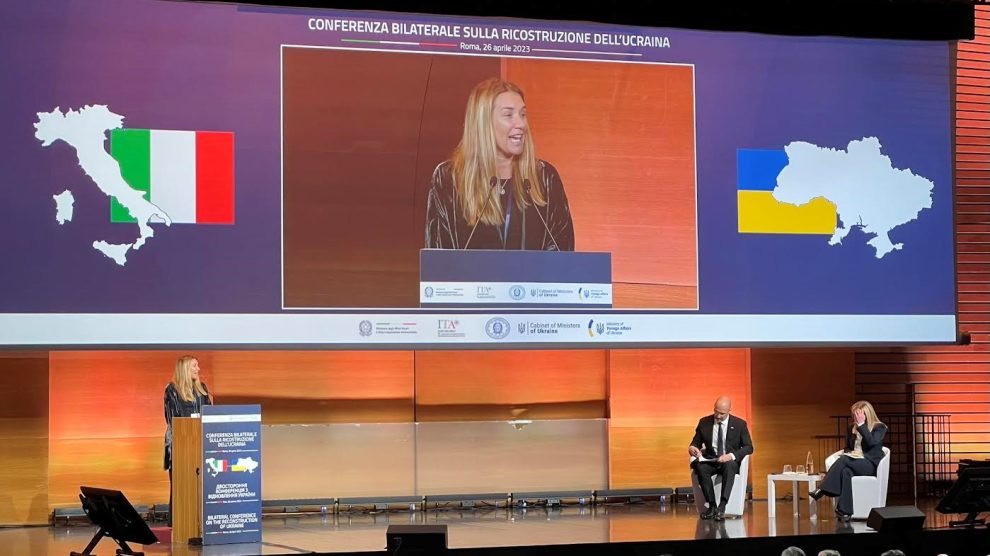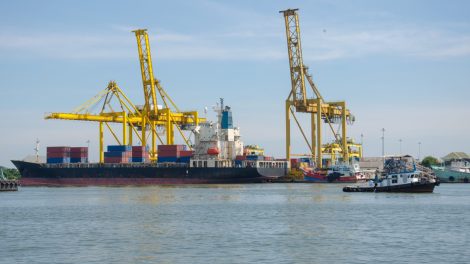The following are excerpts from our sister website’s interview with Confindustria’s Vice-President, Barbara Beltrame Giacomello. Find the full translated text below.
On Italy’s role in rebuilding Ukraine. Wednesday’s bilateral Ukraine Reconstruction Conference in Rome highlighted “the capacity of [Italian] companies and the determination with which they intend to work to concretely support Ukraine’s reconstruction,” as “Italian industry can count on technologies and supply chains that are perfectly suited to the needs of both reconstruction and economic development.”
- “The idea is to focus on synergies in a long-term perspective, going beyond reconstruction, aiming to modernise the country in line with European standards, which is crucial now that Ukraine has been granted candidate status for entry into the European Union.”
On concrete progress. “Possible collaborations have already emerged, for instance, in integrated logistics: an area in which Horonda’s Dry Port, a shunting rail platform to Europe that will connect Ukraine to Verona’s Quadrante Europa interport, will materialise.”
- “So many Italian companies – large enterprises as well as SMEs – are at the forefront in so many sectors, from infrastructure to energy, agribusiness, mechanics, health, digital and steel.”
On moving in synergy with institutions. “Dialogue between governments and businesses is always crucial to ensure inclusive and sustainable progress and growth.” Confindustria aims to “function as a system” and “is ready to work at the service of businesses and alongside institutions in such a delicate mission.”
- The association set up its Ukrainian office at the headquarters of the Italian Embassy in Kyiv in June 2022 as “further evidence of the concrete willingness to work on the reconstruction process right away.”
On the role of institutions. National ones are “fundamental for all aspects related to the operation of companies in a high-risk market,” such as “the need to ensure suitable conditions of access to capital and insurance guarantees on contracts and supplies, so as to improve risk management.”
- International institutions are also crucial “in various areas, first and foremost the financial one. In the case of Ukraine, loans with long-term instalments and subsidised interest, which are borne by the EU and G-7 budgets, must be added to the intervention and assistance programs of individual EU member States.”
Italian companies are looking to rebuild Ukraine, and they can make a “substantial contribution through excellent technologies and high value-added skills.” That’s the take from Barbara Beltrame Giacomello, Vice-President of Confindustria (the Italian industrial association and chamber of commerce) who oversees internationalisation, right after she attended the bilateral Ukraine Reconstruction Conference in Rome on Wednesday. We caught up with her for an interview.
What did you make of the event?
Wednesday highlighted the capacity of our companies and the determination with which they intend to work to concretely support Ukraine’s reconstruction. Italian industry can count on technologies and supply chains that are perfectly suited to the needs of both reconstruction and economic development in that country. The various panels highlighted how our companies can make a substantial contribution, thanks to technologies of excellence and high value-added skills. The idea is to focus on synergies in a long-term perspective, going beyond reconstruction, aiming to modernise the country in line with European standards, which is crucial now that Ukraine has been granted candidate status for entry into the European Union.
Is Confindustria satisfied with how the Italian system is moving in this specific area?
Dialogue between governments and businesses is always crucial to ensure inclusive and sustainable progress and growth. Aiming to function as a system, Confindustria is ready to work at the service of businesses and alongside institutions in such a delicate mission, as is Ukraine’s reconstruction. I am convinced that only in this logic – moving in synergy – will we succeed in this important task. Confindustria was the first European industrial confederation to testify directly to the government of Ukraine and to the entire Ukrainian people of its unwavering support for their sovereignty, independence and freedom when President Carlo Bonomi met with President Volodymyr Zelensky in Kyiv in June 2022. On that occasion, Confindustria also inaugurated its office at the headquarters of the Italian Embassy in Ukraine, further evidence of the concrete willingness to work on the reconstruction process right away.
What were the main and most urgent requests that came from Ukraine?
First of all, today more than ever, it is urgent to restore ties with Ukraine. Reconstruction is the indispensable prerequisite for building a future of peace and rebirth, based on principles of freedom and defence of the international order. Possible collaborations have already emerged, for instance, in integrated logistics: an area in which Horonda’s Dry Port, a rail shunting platform to Europe that will connect Ukraine to Verona’s Quadrante Europa interport, will materialise. But so many Italian companies – large enterprises as well as SMEs – are at the forefront in so many sectors, from infrastructure to energy, agribusiness, mechanics, health, digital and steel. Italian industry intends to put all its production and investment capabilities at Ukraine’s disposal, because it really wants to play a leading role in economic recovery. And Confindustria, with all its articulations, will not fail to provide adequate support.
What role can national institutions play for companies looking at Ukraine’s reconstruction?
The role of institutions is fundamental for all aspects related to the operation of companies in a high-risk market. For example, I am thinking of the need to ensure suitable conditions of access to capital and insurance guarantees on contracts and supplies, so as to improve risk management.
What about international ones?
International institutions also play a crucial role in various areas, first and foremost the financial one. In the case of Ukraine, loans with long-term instalments and subsidised interest, which are borne by the EU and G-7 budgets, must be added to the intervention and assistance programs of individual EU member States. In February, the World Bank, together with the government of Ukraine, the European Commission and the United Nations, raised the estimate of the amount needed for Ukraine’s reconstruction and recovery to $411 billion, up from the previous estimate of $349 billion made in September. Given the enormity of what is at stake, recovery efforts must be part of an inclusive multilateral process, involving both the public and private sectors, as well as international organisations. And this is exactly the path on which Wednesday’s conference moved.





